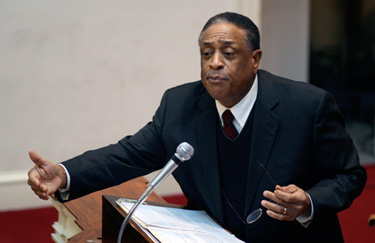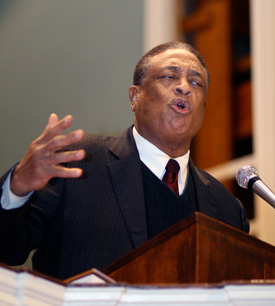January 19th is a date dedicated to the remembrance of not merely a cultural hero, nor one of national merit, but rather, one of international standing: Dr. Martin Luther King, Jr. The memory of Dr. King was celebrated throughout the world as the representation of the dream of equality, a dream which Dr. Cain Hope Felder, visiting speaker to Wabash College from Howard University in Washington, DC, believes the nation is at last beginning to realize.
See Photos from the day's events here and here.
 Dr. Felder is a man of stature in terms of scholarly accomplishment, with a stunning list of degrees from such prestigious institutions as Columbia University, where he received his Ph. D., Oxford University, where he received his Diploma of Theology, and his own Howard University, amongst myriad others. Dr. Felder was involved Monday in Wabash’s three events celebrating Dr. Martin Luther King, Jr. Day, beginning with a brisk, 9:55 a.m. march from the Chapel to Trippet Hall, and ending it with a hope-filled, passionate speech in the Chapel . He addressed both the monumental achievements of Dr. King and the unprecedented election of America’s first black president.
Dr. Felder is a man of stature in terms of scholarly accomplishment, with a stunning list of degrees from such prestigious institutions as Columbia University, where he received his Ph. D., Oxford University, where he received his Diploma of Theology, and his own Howard University, amongst myriad others. Dr. Felder was involved Monday in Wabash’s three events celebrating Dr. Martin Luther King, Jr. Day, beginning with a brisk, 9:55 a.m. march from the Chapel to Trippet Hall, and ending it with a hope-filled, passionate speech in the Chapel . He addressed both the monumental achievements of Dr. King and the unprecedented election of America’s first black president.
Felder’s tone throughout the evening’s address was one which maintained a wonderfully swinging pendulum, back and forth from gravitas to light-hearted humor and playful speech. "I am pleased and honored to be with you here tonight at Wabash College," Felder said. "It’s a formal excuse to get the hell out of Washington for the next few days!" Felder quickly moved on to business, though, when he began to speak on the almost revolutionary change in America, and the first vestiges of the realization of Dr. King’s iconic "I have a Dream" speech.
The dream, Felder stated, was, when King spoke the words, just that: a dream. Now, however, the dream is physically manifested in reality. "It is remarkable indeed that we have lived to see the dream," Felder said. "Many of us never imagined we'd be alive to see the beginning of the dream come true. In our lifetime change is coming, not merely for and from African Americans, but from the majority of America; throughout America."
Felder continued his oration with an anecdote regarding King's assassination, and the impact, the connotation, of that assassination on his own life. Living in England at the time, Felder felt entirely disconnected from that unforgettable crisis which would forever be a defining event for the country, and that he was missing perhaps some of the most important moments in the life of America up to that point. However, he was soon overcome by the intensely self-evident fact of King's permeation and presence reverberating internationally, and by the pain and loss felt by so many at his death.
 "I'll never forget where I was when Dr. King was killed," Felder began. "I was stuck in Oxford, and felt as if history was passing me by. Soon after the assassination, I was approached and was asked to lead a solidarity march for King. They asked us to march together. I then realized that King, the King of Love, had a life which affected people throughout the world."
"I'll never forget where I was when Dr. King was killed," Felder began. "I was stuck in Oxford, and felt as if history was passing me by. Soon after the assassination, I was approached and was asked to lead a solidarity march for King. They asked us to march together. I then realized that King, the King of Love, had a life which affected people throughout the world."
Obama's recent election was a theme which was broached throughout Felder's speech. The election served as another of America's defining moments. It denoted change, but it showed the voters' desire for said change; the fact that the nation was fed up with the status quo, was tired of incompetency, and yearned desperately for a leader. "It is the beginning of a set of remarkable new possibilities on this anniversary of Dr. Martin Luther King, Jr." he said. "We are witnessing two beautiful days in a row in this country. You can keep your dream; we want a daily reality; the dream is taking on flesh!"
Wabash's celebration of Dr. Martin Luther King Jr. day was, as Felder so eloquently put it, the first of "two beautiful days." The nation now awaits, with eager anticipation, the second beautiful day: Obama's Inauguration as the nation's first black president. Even where political beliefs clash, common ground is easily found upon which to stand in the realization that America has taken another step on the road to equality.
Photos by Steve Abbott '09